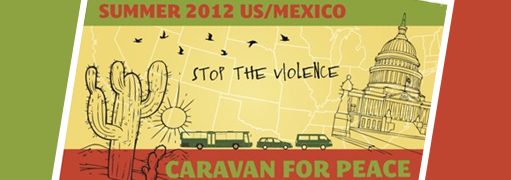Javier Sicilia will not write a poem about his visit to Albuquerque.The poet will not write a poem about the caravan that brings him here: around 70 victims of violence in Mexico traveling from West to East Coast of the U.S. He will not write a poem about the last year he has spent as one of the most famous people in Mexico, or about the anti-violence campaign that catapulted him into the national limelight.He will not write these poems because he has already written his last poem. A poem for his murdered son.Instead of poetry, Sicilia and his companions will bring a message of peace to Albuquerque. He penned an open letter, titled "Estamos Hasta la Madre," which can be roughly translated as "We’re Fed Up." The letter is addressed to "the politicians and the criminals" of Mexico, and it places the blame equally on both groups for the wave of violence that has overtaken the country since President Felipe Calderón declared a war on drugs five and a half years ago.Sicilia’s son is among the estimated 80,000 killed by drug gangs in Mexico since the start of the war. The letter his father wrote after his death helped galvanize the Mexican public to join a growing struggle against business as usual.Taking up the banner of "Estamos Hasta la Madre," the Movement for Peace with Justice and Dignity was born. It traveled from the top to the bottom of Mexico in a "caravan of consolation" to demand an end to the drug war and the violence it entails. There are many people living in our state and all over the U.S. who have lost friends and relatives to the violence in Mexico. But the links between our southern neighbor’s struggle and ours go far beyond family ties.I was lucky enough to see Sicilia speak in Tepoztlán on the first anniversary of the movement’s birth. An audience member asked what people in the United States can do to help.There are three principal things we should demand of our government, Sicilia said. We must stanch the southern flow of firearms by implementing stricter gun control policies. We must end U.S. military aid to Mexico in the form of the Mérida Initiative. And we must legalize drugs.The first is a no-brainer. The Mexican government says it’s seized 68,000 guns originating from the States in the last five years alone. And we need gun control for our own sake, too, as the tragedies in Colorado and Wisconsin prove. As long as we keep demanding access to high-powered assault weapons (guns that have no practical utility except the murder of large numbers of people at one time), the bodies will keep piling up on both sides of the border.The second point, dealing with the Mérida Initiative, is a little more complicated. The initiative was first passed under President George W. Bush but, like so many other horrible programs, it has continued at full tilt under Obama. The U.S. gives about $300 million a year to Mexico, the majority of which is used to buy guns for the military. A case of military corruption wherein four former high-ranking officials were accused of ties to the Beltrán Leyva Cartel underscores one of the basic problems with the Mérida Initiative. If the top dogs in the Mexican military have cartel ties, the Mérida Initiative is giving guns directly to the cartels it supposedly fights.The initiative also fits in perfectly with the narrative of the Occupy Wall Street protests. It’s a government program that takes huge sums of money from ordinary taxpayers—the 99 percent—and redistributes it to giant corporations. In this case, the corporations getting the money are arms dealers, among the most odious groups on the planet. The final result of the Mérida Initiative is that the American lords of war feast on the blood of the Mexican populace, and you and I get stuck with the bill.Sicilia’s final proposal, legalizing drugs, may be the most controversial of all. But it’s the right way to go.First of all, it would immediately leach power from the Mexican cartels as established, legal businesses took over the sale of narcotics. When the sale of drugs is illegal, it becomes a business that naturally attracts criminals and then makes those criminals rich, giving them money for all the guns—and hired guns—they could ever need. There’s a reason why the Juárez Cartel and the Sinaloa Cartel murder each other by the thousands, while the companies that make Tecate and Corona do not. The only difference between these two businesses, both of which sell highly addictive intoxicants that cause a litany of social problems, is that one is a black market and the other is fully legal. I don’t know if the members of the Movement for Peace with Justice and Dignity will touch on these themes during their visit on Saturday. But I do know that whatever they say, it will be worth hearing. And if social justice groups in the U.S. take up their cause, there may yet be hope for ending violence on both sides of the border. Disclosure : I’ve played a minor role in organizing Sicilia’s visit to Albuquerque. I hope this goes without saying, but I’ve never received monetary compensation for my work with the group.
Caravana USA
Saturday, Aug. 18, noon
Holy Family Parish
562 Atrisco SW
bit.ly/CaravanaUSAAndrew Beale is a participant in (Un)occupy Albuquerque, but he does not speak on behalf of the movement.
The views expressed are solely those of the author.





